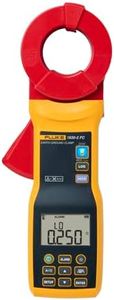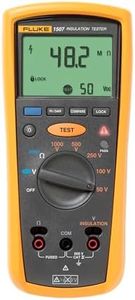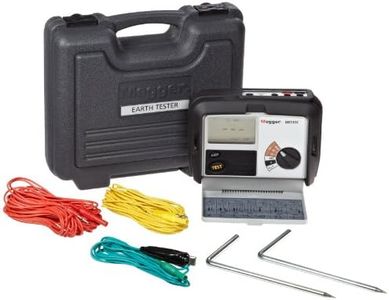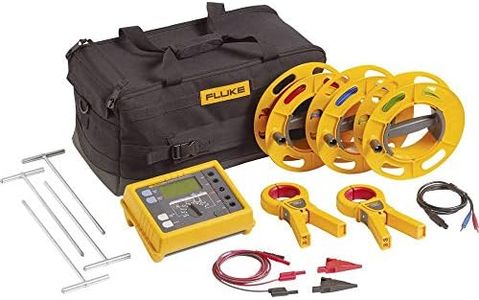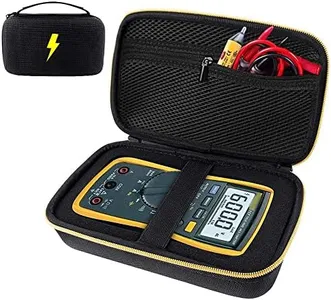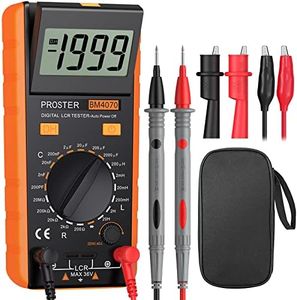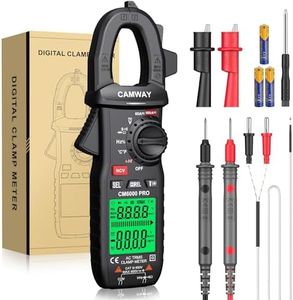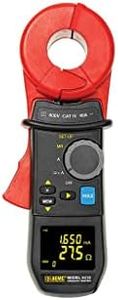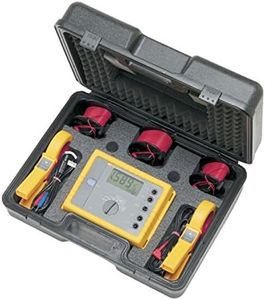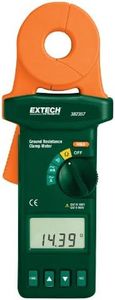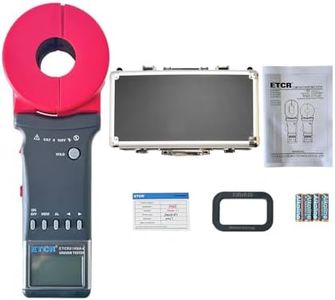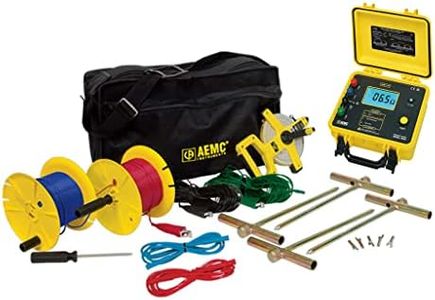10 Best Ground Resistance Testers 2025 in the United States
Our technology thoroughly searches through the online shopping world, reviewing hundreds of sites. We then process and analyze this information, updating in real-time to bring you the latest top-rated products. This way, you always get the best and most current options available.

Our Top Picks
Winner
Fluke 1630-2 FC Earth Ground Clamp
Most important from
23 reviews
The Fluke 1630-2 FC Earth Ground Clamp is a strong choice for professionals needing reliable ground testing without the hassle of disconnecting the grounding system. One of its standout features is the ability to measure ground loop impedance effortlessly, making it efficient for on-site evaluations. The new rugged jaw design ensures durability, which is essential for tough working conditions, while maintaining accuracy even with rough handling. This tool is also equipped to save and share data through Fluke Connect, enhancing usability and collaboration for teams.
The size of the clamp—measuring 14.17 x 13 x 11.81 inches and weighing around 1.94 pounds—might make it less portable for some users, especially those who need to carry multiple tools. Additionally, while it performs tests without driving stakes, some testing scenarios could benefit from more traditional methods, especially in specific environments. However, this feature still adds convenience for many applications.
The requirement for 4 AA batteries is standard, but it’s always good to keep spares handy for extended use in the field. This product is ideal for electricians, maintenance professionals, or anyone responsible for ensuring safety and compliance in electrical systems. With its blend of advanced features and robust design, the Fluke 1630-2 FC is well-suited for those who prioritize accuracy and efficiency in their ground resistance testing.
Most important from
23 reviews
Fluke 1507 Digital Megohmmeter Insulation Resistance Tester, For Advanced Industrial and Electrical Insulation Testing, Offers Multiple Insulation Test Voltages: 50 V, 100 V, 250 V, 500 V, and 1000 V
Most important from
240 reviews
The Fluke 1507 Digital Megohmmeter is a solid choice for professionals needing reliable insulation resistance testing in industrial and electrical applications. With a measurement range that includes five different insulation voltages (50 V to 1000 V), it is versatile enough to handle various testing needs. Its accuracy of +/-0.5% ensures that users can trust their results, which is crucial for safety and compliance.
One standout feature is the live circuit detection, which automatically prevents the tester from operating if it detects voltages above 30 volts. This enhances user safety, making it suitable for both novice and experienced technicians. The large, backlit display also simplifies reading measurements, even in low-light conditions, which is a thoughtful touch for fieldwork.
The inclusion of a remote test probe is a practical advantage, as it allows for testing in hard-to-reach areas, and the Compare (Pass/Fail) function streamlines repetitive testing processes, saving time during inspections. In terms of durability, the plastic build is standard but might not withstand heavy drops compared to more rugged options. Still, it meets the EN 61010-1 specification, indicating it adheres to safety standards. For users in industries where precise insulation testing is critical, the Fluke 1507 is a dependable tool that balances functionality with user safety, making it a strong contender in the ground-resistance tester market.
Most important from
240 reviews
Klein Tools ET600 Multimeter, Megohmmeter Insulation Tester, 4000 Ohms Resistance, 125V/250V/500V/1000V, Auto-Ranging TRMS Multimeter
Most important from
1285 reviews
The Klein Tools ET600 Multimeter is a versatile tool designed for those who need to conduct comprehensive electrical diagnostics, including ground resistance testing. One of its standout features is its ability to measure insulation resistance up to 4000MΩ at multiple voltage levels (125V, 250V, 500V, 1000V), which is quite robust and versatile for various applications. This range makes it suitable for both residential and industrial purposes. The ET600 boasts high accuracy with True Root Mean Square (TRMS) technology, ensuring reliable and precise measurements. This is essential for anyone who needs to trust their readings, such as electricians or maintenance technicians.
The user-friendly design includes a backlit display with a bar graph, making it easier to read measurements even in low-light conditions. Its test and lock buttons simplify the testing process, which is great for those who may not be deeply familiar with electrical testing tools. Safety is also a priority, with a warning alarm and high voltage icon to alert users of potential dangers. However, there are some points to consider. The ET600’s durability and build quality are decent, but it may not be the best choice for extremely harsh environments.
It also has a low battery indicator, which is useful, but frequent battery changes could be a minor inconvenience. The device is battery-powered, which means users need to keep spare batteries handy to avoid interruptions during critical testing. While it offers multiple measurements and features, its weight of 1.4 pounds might be slightly cumbersome for prolonged use. In essence, it’s a solid choice for those in need of a multifunctional and accurate ground-resistance tester that’s relatively easy to use and packed with practical features.


